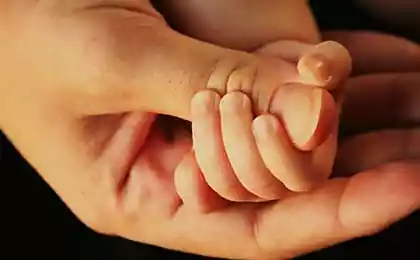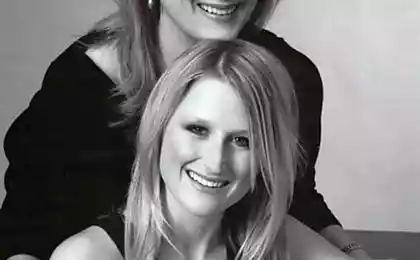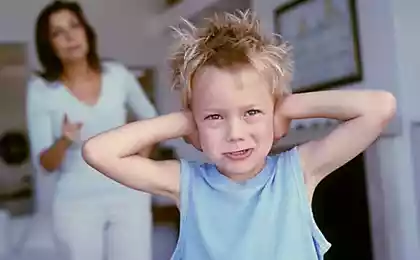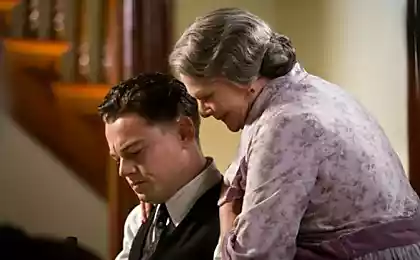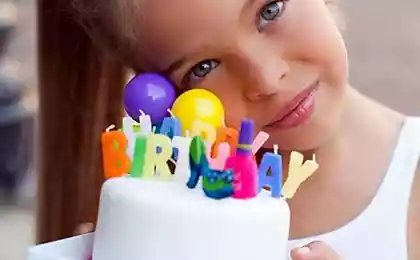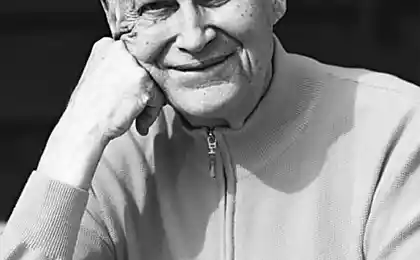426
Birth trauma.
How is it transmitted, trauma?It is clear that everything can always be explained by “flow”, “weaves”, “birth memory”, etc., and it is quite possible that you can not do without mysticism at all, but if you try? Take only the most understandable, purely family aspect, parent-child relations, without politics and ideology. About them later.
A family lives. Young, just married, waiting for a baby. Or just had a baby. Maybe two of them did. Love, happy, hopeful. And then disaster happens. The flywheels of history moved and went to grind the people. Most often, men are the first to fall into the millstone. Revolutions, wars, repressions are the first blow to them.

©Yuri Nagulko. The Whirlpool of Time
The young mother was left alone. Her lot is constant anxiety, unbearable work (you need to work and raise a child), no special joys. A funeral, "ten years without correspondence," or just a long absence without news, such that hope fades. Perhaps this is not about her husband, but about her brother, father, and other relatives.
What is the state of the mother? She is forced to keep herself in control, she cannot really give herself to grief. There is a child, and there are many other things.The pain tears from the inside, and it is impossible to express it, you can not cry, you can not “tear” it. And it rocks. He freezes in stoic tension, turns off feelings, lives, gritting his teeth and gathering his will into a fist, does everything on an automatic basis. Or, even worse, she plunges into a hidden depression, walks, does what she should, although she wants only one thing - to lie down and die.
Her face is a frozen mask, her hands are heavy and do not bend. She physically hurts to respond to the smile of the child, she minimizes communication with him, does not respond to his babble. The child woke up at night, called out to her – and she howls deafly into the pillow. Sometimes anger erupts. He crawled up or approached, rubbed her, wants attention and affection, she responds when she can, through force, but sometimes suddenly growls: “Yes, let go,” as she pushes that he will already fly away. No, she is not angry with him - at fate, at her broken life, at the one who left and left and will not help anymore.
Only here the child does not know all the background of what is happening. They don’t tell you what happened (especially if you’re young). Or he even knows, but he can't understand. The only explanation that he can come up with is that my mother doesn’t love me, I’m disturbing her, I wish I hadn’t.His personality cannot be fully formed without constant emotional contact with his mother, without exchanging glances, smiles, sounds, caresses with her, without reading her face, recognizing the shades of feelings in her voice.It is necessary, laid by nature, it is the main task of infancy. What if your mother has a depressive mask on her face? If her voice is monotonously dim with grief, or tense with anxiety?
While the mother is vomiting, so that the child elementary survived, did not die of hunger or disease, he grows himself, already traumatized.. Not sure he's loved, not sure he's needed, with poor empathy. Even intelligence is impaired in conditions of deprivation. Remember the painting "Again Two"? It was written at 51. The main character is 11 years old. A child of war more traumatized than the older sister who took over the first years of normal family life, and the younger brother, a beloved child of postwar joy, the father is back alive. There's a trophy clock on the wall. It's hard for a boy to learn.
Reticks. Two again.
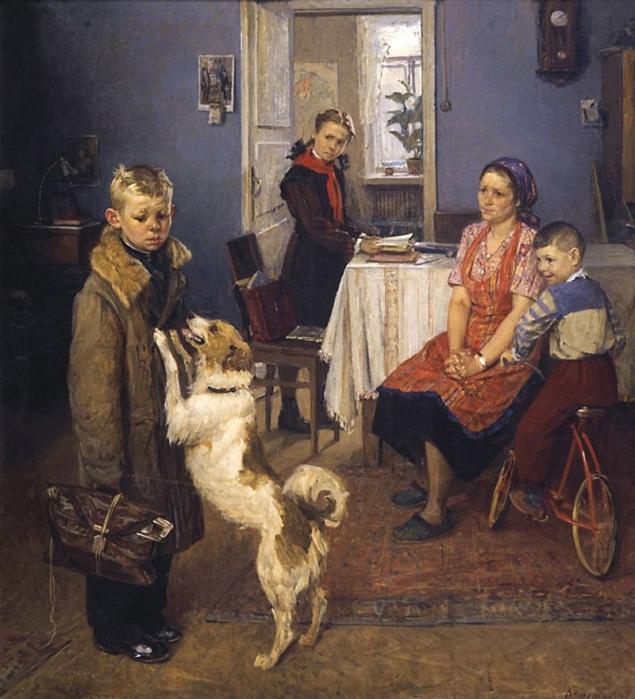
Of course, everything is different. The reserve of spiritual strength in different women is different. The severity of grief is different. Different character. It is good if the mother has sources of support - family, friends, older children. And if not? Is the family isolated as “enemies of the people” or evacuated to an unfamiliar location? Here either die or stone, but how else to survive?
Years pass, very difficult years, and a woman learns to live without a husband. “I am a horse, I am a bull, I am a woman and a man.” A horse in a skirt. Baba and eggs. Call it what you want, it's one thing. This is a man who carried an unbearable burden, and got used to it. Adapted. He just can't do it any other way. Many remember, probably, grandmothers who just physically could not sit idle. The old ones were busy, everyone was carrying bags, everyone was trying to chop wood. It became a way of coping with life. By the way, many of them became so steely — yes, this is the sound — that they lived a very long time, they did not take diseases, and old age. They are still alive, God bless them.
In its most extreme expression, in the most terrible confluence of events, such a woman turned into a monster capable of killing with her care. And she continued to be iron, even if it was no longer necessary, even if she lived with her husband again, and the children were not in danger. It's like a promise.
The brightest image is described in the book by Pavel Sanayev “Bury me behind the plinth”.
And here is what Ekaterina Mikhailova writes about “The Scary Woman” (“I am alone” the book is called): “Dumb hair, squeezed into a thread of the mouth ..., cast-iron step ...” Scary, suspicious, merciless, insensitive. She is always ready to slap a piece or slap a slap: “You won’t be attacked by you parasites.” Eat, come on! Do not squeeze a drop of milk from her breasts, all of it is dry and hard. There is much more to be said, and if anyone has not read these two books, it is necessary.
The scariest thing about this pathologically altered woman is not rudeness or power. The worst thing is love. When, reading Sanayev, you realize that this is a story about love, about such a disfigured love, that’s when the frost rips through. I had a childhood girlfriend, the late child of a mother who had survived a blockade as a teenager. She told how she was fed, holding her head between her shins and pouring broth into her mouth. Because the child no longer wanted and could not, and the mother and grandmother thought it was necessary. Their hunger so experienced from the inside gnawed that the cry of a living girl, a dear, loved one, the voice of this hunger could not block.
My mother took my other girlfriend with her when she had clandestine abortions. And she was showing her little daughter a toilet full of blood saying, Look, guys, what are they doing to us? Here it is, our women's share. Did she want to hurt her daughter? No, just keep it safe. It was love.
And the most terrible thing is that the features of the Scary Woman are still worn by our entire child protection system. Medicine, school, guardianship. The main thing is that the child is “okay”. To keep the body safe. Soul, feelings, attachments - not before. Save it at all costs. Feed and cure. Very, very slowly this weathers out, and we in childhood completely got the nanny, who was a sex rag in the face, who did not sleep during the day, I remember very well.
But let us leave aside the extreme cases.Just a woman, just a mom. Just grief. Just a child who grew up with a suspicion that he is not needed and unloved, although this is not true and for him only his mother survived and endured everything.. And he grows up trying to earn love, since it is not given to him for free. It helps. Doesn't require anything. I'm busy with myself. She watches the younger ones. He's making progress. Trying very hard to be useful. Only useful people like it. Only comfortable and right. Those who do the lessons themselves, and the floor in the house will wash, and the younger will lay down, dinner will be prepared for the arrival of the mother.
Have you ever heard such stories about post-war childhood? "We couldn't have thought of talking to our mother like that!" is about modern youth. You bet. You bet. The iron woman has a heavy hand. And secondly, who would risk the crumbs of warmth and intimacy? It's a luxury, you know, to be rude to parents.
The injury went to the next round.The time will come, and this child will create a family, give birth to children. It's like this in the '60s. Someone was so “rolled” by an iron mother that he was able only to reproduce her style of behavior. We must not forget that mothers, many children are not very strong and saw, in two months - nursery, then five-day, all summer - with a garden in the country, etc. That is, “rolled” not only the family, but also institutions in which “Scary women” always had enough. But let’s look at the more favorable option. The child was traumatized by the grief of his mother, but his soul did not freeze. And here in general, the world and the thaw, and in space flew, and so want to live, and love, and be loved. For the first time taking in his arms his own, small and warm child, a young mother suddenly realizes: here he is. This is the one who will finally love her, who really needs her.
From that moment on, her life takes on a new meaning. She lives for the children. Or for the sake of one child whom she loves so passionately that she can’t think of sharing that love with anyone else. She quarrels with her own mother, who tries to unfasten her grandson with nettles - this is not possible. She hugs and kisses her child, and she sleeps with him, and she doesn't breathe in on him, and only now, retroactively, realizes how much she herself was deprived of as a child. She is completely absorbed in this new feeling, all her hopes and aspirations are all in this child. She "lives his life," his feelings, interests, anxieties. They have no secrets about each other. She's better with him than anyone else.
The only bad thing is that it grows. It grows rapidly, and then what? Is it loneliness again? Is it an empty bed again? Psychoanalysts would say a lot about displaced eroticism and all that, but it seems to me that there is no special eroticism here. Just a kid who's had lonely nights and doesn't want to anymore. He doesn't want it so badly that he's out of his mind. “I can’t sleep until you come.” It seems to me that in our 60-70s, this phrase was more often said by mothers to children, and not vice versa.
What's going on with the baby? He can't help but respond to his mother's passionate request for love. That's his strength. He merges happily with her, he cares, he fears for her health. The worst is when your mother is crying or when her heart hurts. Not that. "Okay, I'll stay, Mom.
Of course, Mom, I don't want to go to this dance. But in fact, I want to, because there is love, independent life, freedom, and usually the child still breaks the bond, tears up painfully, hard, with blood, because no one will voluntarily let go. He goes away with guilt and leaves his mother with resentment. She gave her whole life, and did not sleep at night. She's invested all of herself, no balance, and now she presents a promissory note, and the child does not want to pay. Where's justice? Here the legacy of the “iron” woman comes in handy, scandals, threats, pressure are used. Oddly enough, this is not the worst option. Violence breeds resistance and allows you to separate, although suffering losses.
Some play their role so skillfully that the child simply cannot leave. Addiction, guilt, fear for the health of the mother are tied by thousands of strong threads, about this there is a play by Ptushkina “While she was dying”, according to which a much lighter film is made, Vasilyeva’s mother plays, and Yankovsky plays a contender for her daughter. Every New Year, you can probably see it all. The best option, from the mother’s point of view, If the daughter still gets married for a while and stays with the child. And then the sweet union can be transferred to the grandson and continued, and, if you are lucky, enough until death.
And often enough, because this generation of women is much less healthy, they often die much earlier than their war mothers. Because there is no steel armor, and the blows of resentment destroy the heart, weaken the defense against the most terrible diseases. Often, their health problems begin to be used as an unconscious manipulation, and then it is difficult not to play, and suddenly everything turns out to be really bad. At the same time, they themselves grew up without maternal attentive tender care, which means that they are not used to taking care of themselves and do not know how to take care of themselves, are not treated, do not know how to pamper themselves, and, by and large, do not consider themselves such a great value, especially if they are sick and become “useless”.
But we're all about women, but where are men? Where are the fathers? Did someone have to have children?
It's hard. A girl and a boy who grew up without fathers start a family. They are both hungry for love and care. They both hope to get it from their partner. But the only family model known to them is a self-sufficient “baba with eggs”, which, by and large, does not need a man. I mean, cool, if there is, she loves him and all that. But he really doesn't need anything, not sewing the mare's tail, rose on the cake. “Sit, dear, on the sidelines, watch the football, because you are disturbing the floors. Don't play with a child, you walk him around, then he won't fall asleep. Don't touch it, you'll ruin it. Get back, I'll do it. All that stuff. Boys are raised by mothers, too. We're used to listening. Psychoanalysts would also note that they did not compete with their father for their mother and therefore did not feel like men. Physically, the mother of the wife or husband, or both, was often present in the same house. Where do we go? Come here be a man...
Some men found a way out by becoming a "second mother." Or even the only one, because the mother herself, as we remember, rumbles with eggs and iron. In the best version, it turned out something like Uncle Fedor’s dad: soft, caring, sensitive, all-permissive. In the middle, there's a workaholic who just ran off to work from it all. In the bad, an alcoholic. Because a man who does not need his woman for nothing, who all the time hears only “go away, do not interfere”, and through the comma “what kind of father are you, you do not care about children at all” (read “don’t do what I think is necessary”), either change a woman – and for whom, if everyone around is approximately like this? – or go into oblivion.
On the other hand, The man himself does not have a clear model of responsible fatherhood.. In front of their eyes or in the stories of their elders, many fathers simply got up one morning and left—and never came back. Just like that. Nothing, okay. Therefore, many men considered it quite natural that, leaving the family, they ceased to have a relationship with her, did not communicate with children, did not help. They sincerely believed that they owed nothing to this “hysterical woman” who remained with their child, and on some deep level, maybe they were right, because often women just bugged them like inseminators, and they needed children more than men. So the question is who owes who. The resentment that the man felt made it easy to agree with his conscience and score, and if this was not enough, then vodka is sold everywhere.
Oh, these divorces of the seventies are painful, cruel, with the ban on seeing children, with the breakup of all relationships, with insults and accusations. The excruciating disappointment of two unloved children who so wanted love and happiness, so much hope was placed on each other, and he / she – cheated / and everything is wrong, bastard, bitch, scum. They did not know how to establish a cycle of love in the family, everyone was hungry and wanted to receive, or only wanted to give, but for this – the authorities. They were terribly afraid of loneliness, but it was to him that they went, simply because, apart from loneliness, they had never seen anything.
The result is resentment, mental wounds, even more ruined health, women are even more fixated on children, men drink even more.
In men, identification with deceased and disappeared fathers was superimposed on all this. Because the boy needs, it is vitally necessary to be like the father.. What if the only thing we know about him is that he died? Was he brave enough to fight his enemies and die? Or worse, do you know that you are dead? And they don't talk about him in the house because he went missing or was repressed? Gone, that's all the information? What is left for a young man other than suicidal behavior? Drinks, fights, cigarettes three packs a day, motorcycle racing, work before a heart attack. My father was a high-rise installer in his youth.
My favorite thing was to work at height without insurance. Well, everything else too, booze, smoking, ulcers. Divorce, of course, is not alone. At 50, heart attack and death. His father went missing, went to the front before the birth of his son. Nothing is known except the name, no photo, nothing.
Here in this approximately entourage grow children, the third generation.
In my class, more than half of the children had divorced parents, and of those who lived together, maybe only two or three families looked like marital happiness. I remember my college friend telling me that her parents were watching TV and kissing. She was 18, gave birth early, meaning her parents were 36-37. We were all amazed. Are they crazy? It doesn't happen!
Naturally, the corresponding set of slogans: “All men are bastards”, “All women are bitches”, “A good deed will not be called marriage”. Well, life confirmed it. Wherever you look...
But a good thing happened. In the late 60s, mothers were able to sit with children up to a year. They were no longer considered parasites. Here is to whom the monument to put, so the author of this innovation. I don't know who he is. Of course, the year still had to give, and it was traumatic, but it is incomparable, and about this injury next time. And so the children happily passed the most terrible threat of deprivation, the most crippling - up to a year. Well, usually people turned around even later, then my mother will take a vacation, then grandmothers in turn, still won a little. Such a game was constant – the family against the “coming of the night”, against the “Dread Woman”, against the iron heel of the Motherland. Cat and mouse.
And then there was a good thing – separate housing began to appear. Crunchy things. We will also one day erect a monument to these flimsy concrete walls, which have fulfilled a huge role - finally covered the family from the all-seeing eye of the state and society. Everything was heard through them, but there was no autonomy. Border. Protection. Burrow. Chance of recovery.
The third generation begins their adult life with their own set of injuries, but also with their own rather large resource. We were loved. Not as psychologists say, but sincerely and a lot.We had fathers. Most drinkers and/or heels and/or mother-abandoned goats, but they had a name, a face and loved us in their own way. Our parents weren't violent. We had a house, home walls.
Not everyone was the same, of course, the family was more and less happy and prosperous.
But by and large.
That’s what we’re supposed to do. *** So, third generation. I will not be rigidly attached to the years of birth here, because someone was born at 18, someone at 34, the further away, the more the distinct “banks” of the flow blur. The transmission of the script is important here, and the age can be from 50 to 30. In short, the grandchildren of the military generation, the children of war.
“We owe it” is the motto of the third generation. Generations of children forced to become parents of their parents. In psychologists, this is called “parentification”.
What was I supposed to do? Disgruntled children of war spread so powerful fluids of helplessness that it was impossible not to respond. Therefore, the children of the third generation were independent and felt a constant responsibility for their parents. Childhood with a key around the neck, from the first grade independently to school – to the music room – to the store, if through the wasteland or garages – also nothing. We know how to heat the soup ourselves. The main thing is that my mother is not upset.
Very revealing memories of childhood: “I did not ask anything from my parents, I always understood that there was not enough money, I tried to sew up, manage,” “I once hit my head very hard at school, it was bad, it was sick, but I did not tell my mother – I was afraid to upset.” Apparently, there was a concussion, and the consequences are still”, “My neighbor molested me, tried to touch, then showed his farm. But I did not tell my mother, I was afraid that she would become ill with her heart, I was very longing for my father, even crying slowly. But my mom told me I was fine and I didn't need him at all. She was very angry with him after the divorce.”
Dina Rubinna has such a story piercing "Ternivnik".Classic: A divorced mother, a six-year-old son, selflessly portraying indifference to his father, whom he loves passionately. Together with his mother, curled up in his little lair against a foreign winter world. And these are all quite prosperous families, it also happened that children searched for drunken fathers in the ditches and dragged home on themselves, and the mother was pulled out of the loop with their own hands or tablets were hidden from her. Like eight years old.
And divorce, as we remember, or life in the style of a cat and a dog. And mediator children, peacemakers, who are ready to sell their souls to reconcile their parents, to glue together the fragile family well-being again. Don't complain, don't sharpen, don't shine, or Dad will get angry, and mom will cry, and say that "it would be better for her to die than to live like this," and this is very scary. Learn to anticipate, smooth corners, defuse the situation. Always be vigilant and look after your family. There's no one else.
The symbol of the generation can be considered the boy Uncle Fedor from a funny cartoon. Funny, but not so funny. The boy in the whole family is the oldest. And he doesn't go to school either, so he's not seven. He went to the village, lives there himself, but worries about his parents. They only faint, heart drops drink and hands helplessly dilute.
Do you remember the boy Roma from the movie You Never Dreamed? He is 16 and the only adult in the film. His parents are typical “children of war”, the girl’s parents are “eternal teenagers”, a teacher, a grandmother. To comfort them, to support them, to reconcile them, to help them, to wipe away tears. And all this against the background of lamentations of adults, they say, early for love. Yeah, and babysitting them all is fine.
It's like childhood. And when it came time to grow up and leave the house - the torments of impossible separation, and wine, wine, wine, in half with anger, and the choice is very cheerful: get off and it will kill mommy. Or stay and die as a person.
However, if you stay, you will always be told that you need to arrange your own life, and that you do everything wrong, bad and wrong, otherwise your family would have long ago. With the appearance of any candidate, he would naturally be useless, and a long underground war would begin against him until the victorious end. There are so many books and movies that I won’t even list.
Interestingly, both they and their parents perceived their childhood as quite good. In fact: children are loved, parents are alive, life is quite prosperous. For the first time in many years, a happy childhood without hunger, epidemics, war and all that.
Well, almost happy. Because there was a kindergarten, often with a five-day, and school, and camps and other charms of Soviet childhood, which were suited to someone and not so much. And there was a lot of violence there, and humiliation, and parents helpless, could not protect. Or, in fact, they could, but the children did not turn to them. I never told my mother that kindergarten rags are beaten in the face and barley through vomiting spasms in the mouth. Although now, in hindsight, I understand that she would probably tear this garden apart. But then I thought I couldn't.
This is an eternal problem – the child is uncritical, he cannot reasonably assess the real state of affairs. He always takes everything personally and exaggerates greatly. And always willing to sacrifice. Just as the children of war mistook ordinary fatigue and grief for dislike, so their children mistook some of the immaturity of fathers and mothers for complete vulnerability and helplessness. Although this did not happen in most cases, and it was possible for parents to stand up for their children, and would not fall apart, would not die of a heart attack. And the neighbor would be shortened, and the babysitter would be shortened, and they would buy what they needed, and they would let them see Dad. But the kids were scared. Exaggerated, reinsured. Sometimes, when it came out, my parents would be horrified and say, ‘Well, why did you tell me? Of course I would. No answer. Because you can't. That's how it felt.
The third generation was a generation of anxiety, guilt, and hyperresponsibility. All this had its advantages, these people are now successful in various fields, they are the ones who know how to negotiate and take into account different points of view. To anticipate, to be vigilant, to make decisions on your own, not to wait for help from outside are strengths. Care, care, care.
But there is a hyperresponsibility, like any "hyper" and the other side. If the inner child of military children lacked love and security, the inner child of the “Uncle Fedor generation” lacked childishness, carelessness. And the inner child - he will take his own in any way, he is. Well, he does. It is in people of this generation that such a thing as “aggressive-passive behavior” is often observed. This means that in a situation of “need, but do not want”, a person does not openly protest: “I do not want and will not!”, but also does not accept “Well, it is necessary, so it is necessary”. In all sorts of different, sometimes very inventive ways, he sabotages. Forgets, postpones, does not have time, promises and does not do, is late everywhere and so on. Oh, bosses from this howl straight: well, such a good specialist, pro, smart, talent, but so unorganized ...
People of this generation often feel that they are older than others, even the elderly. At the same time, they do not feel “completely grown up”, there is no “sense of maturity”. Youth somehow jumps into old age. And back again, sometimes several times a day.
The consequences of “merging” with parents, all this “living the life of a child” are also noticeable. Many people remember that as a child, parents and/or grandmothers did not tolerate closed doors: “Are you hiding something?” And slamming a latch into your door was like spitting in your mother’s face. Well, that it is normal to check pockets, desk, briefcase and read a personal diary. Rarely do parents find this unacceptable. About the garden and school in general, I keep silent, some toilets were worth what, what the boundaries were. As a result, children who grew up in a situation of constant violation of borders, then observe these boundaries superzealously. They rarely visit and are rarely invited. It’s easy to sleep at home (although it used to be common). They don’t know their neighbors, and they don’t want to know if they start to be friends. Torturously endure any forced neighborhood (for example, in a compartment, in a hotel room), because they do not know, do not know how to set boundaries easily and naturally, while enjoying communication, and put “anti-tank hedgehogs” on distant approaches.
What about the family? Most are still in a difficult relationship with their parents (or their memory), many did not succeed with a strong marriage, or it turned out not on the first attempt, but only after separation (internal) from parents.
Of course, the received and learned in childhood attitudes about the fact that men are only waiting to “swim and throw”, and women only strive to “crude under themselves”, happiness in personal life does not contribute. But there was the ability to “clarify relations”, to hear each other, to negotiate. Divorces have become more frequent, as they have ceased to be perceived as a disaster and the ruin of a whole life, but they are usually less bloody, increasingly divorced spouses can then quite constructively communicate and deal with children together.
Often the first child appeared in a fleeting “insemination” marriage, reproduced. parental model. Then the child was given in whole or in part to the grandmother in the form of a “redemption”, and the mother got a chance to separate and start living her own life. In addition to the idea of consoling your grandmother, here also plays the role of repeatedly heard in childhood “I laid my life on you”. That is, people grew up with the attitude that raising a child, even one, is something unrealistically difficult and heroic.
I often remember how difficult it was with my first child. Even those who gave birth already in the era of diapers, food in jars, washing machines and other stuff. Not to mention central heating, hot water and other benefits of civilization. I spent the first summer with my child in the country, my husband came only for weekends. It was so hard! I was just crying with fatigue. A cottage with amenities, no chickens, no cows, no vegetable garden, the child is quite healthy, the husband brings food and diapers by car. But how hard!
And how not difficult, if you know in advance the conditions of the task: "Life to put, nights not to sleep, health to ruin." If you want to, you don't want to. This attitude makes the child afraid and avoid. As a result, the mother, even sitting with the child, almost does not communicate with him and he openly misses.
Nannies are hired, they change when the child begins to become attached to them – jealousy! – and now we get a new circle – a deprived, unloved child, something very similar to that, military, only there is no war.
Prize race. Look at the children in some expensive boarding house full of content. Tics, enuresis, outbursts of aggression, tantrums, manipulation.
Baby, only English and tennis. And those who do not have money for boarding, those on the playground in the sleeping area can be seen. “Where you go, idiot, now you get it, I have to do the laundry, right?” Well, and so on, "I have no power against you, my eyes would not see you," with genuine hatred in my voice. Why hate? He's an executioner! He came to take life, health, youth, so said the mother!
Another version of the scenario unfolds when another insidious installation of hyper-responsibles takes over: Everything has to be right! The best way! And this is a separate song.
Early adopters of the role of “Uncle Fedora” are often obsessed with conscious parenting. Lord, if they have mastered the role of parenting in relation to their own father and mother, will they not be able to raise their children at the highest level? Balanced nutrition, gymnastics for infants, developing classes from the year, English from three. Literature for parents, read, think, try.
Be consistent, find a common language, do not get mad, explain everything, WORKING A CHILD. And the eternal anxiety, habitual from childhood - what if not? What if they didn’t take it into account? and if it could have been better? And why do I lack patience? What kind of mother am I?
In general, if the generation of children of war lived in the belief that they are wonderful parents, what to look for, and their children have a happy childhood, then the generation of hyper-responsible is almost universally affected by “parental neurosis”. They (we) are sure that they did not take into account something, did not finish it, little was engaged in the child (also dared to work, and build a career, mothers-echids), they (we) are completely unsure of themselves as parents.They are always dissatisfied with school, doctors, society, always want more and better for their children.
A few days ago, I got a call from a friend from Canada with a disturbing question: a daughter at 4 years old does not read, what to do? These disturbing eyes of mothers when meeting a teacher - mine does not make columns! “Ah, we’re all going to die,” as my son, the next generation, likes to say. And he is not yet the brightest, since he was saved by the impenetrable laziness of his parents and the fact that I came across a Nikitin’s book at one time, where it was said in direct text: mothers, do not worry, do as you like and convenient and everything with the child will be fine. There was a lot of things said that you need to play in special cubes and develop everything, but I safely missed this: It has itself developed to a decent scale.
Unfortunately, many with laziness was weak. And they parented with terrible power and full program. The result is not cheerful, now a wave of appeals with the text “He wants nothing.” Lying on the couch, not working or studying. Sitting staring at the computer. He doesn't want to answer for anything. Every attempt to talk is stopped.” What would he want if everyone wanted him? Why should he answer, if there are parents near whom bread is not fed - let him answer for someone? Well, if you're just lying on the couch and not taking drugs. If you don't feed for a week, you might get up. If he already does, it gets worse.
But this generation is just coming into life, let’s not label it yet. Life will tell.
The further, the more the "banks" are eroded, multiply, split, the consequences of the experience are bizarrely refracted. I think by the fourth generation, a specific family context is more important than a global past trauma. But we can’t help but see that much of today grows from the past. published
Author: Lyudmila Petranovskaya
P.S. And remember, just changing our consciousness – together we change the world!
Source: //ludmilapsyholog.livejournal.com/52399.html
A family lives. Young, just married, waiting for a baby. Or just had a baby. Maybe two of them did. Love, happy, hopeful. And then disaster happens. The flywheels of history moved and went to grind the people. Most often, men are the first to fall into the millstone. Revolutions, wars, repressions are the first blow to them.

©Yuri Nagulko. The Whirlpool of Time
The young mother was left alone. Her lot is constant anxiety, unbearable work (you need to work and raise a child), no special joys. A funeral, "ten years without correspondence," or just a long absence without news, such that hope fades. Perhaps this is not about her husband, but about her brother, father, and other relatives.
What is the state of the mother? She is forced to keep herself in control, she cannot really give herself to grief. There is a child, and there are many other things.The pain tears from the inside, and it is impossible to express it, you can not cry, you can not “tear” it. And it rocks. He freezes in stoic tension, turns off feelings, lives, gritting his teeth and gathering his will into a fist, does everything on an automatic basis. Or, even worse, she plunges into a hidden depression, walks, does what she should, although she wants only one thing - to lie down and die.
Her face is a frozen mask, her hands are heavy and do not bend. She physically hurts to respond to the smile of the child, she minimizes communication with him, does not respond to his babble. The child woke up at night, called out to her – and she howls deafly into the pillow. Sometimes anger erupts. He crawled up or approached, rubbed her, wants attention and affection, she responds when she can, through force, but sometimes suddenly growls: “Yes, let go,” as she pushes that he will already fly away. No, she is not angry with him - at fate, at her broken life, at the one who left and left and will not help anymore.
Only here the child does not know all the background of what is happening. They don’t tell you what happened (especially if you’re young). Or he even knows, but he can't understand. The only explanation that he can come up with is that my mother doesn’t love me, I’m disturbing her, I wish I hadn’t.His personality cannot be fully formed without constant emotional contact with his mother, without exchanging glances, smiles, sounds, caresses with her, without reading her face, recognizing the shades of feelings in her voice.It is necessary, laid by nature, it is the main task of infancy. What if your mother has a depressive mask on her face? If her voice is monotonously dim with grief, or tense with anxiety?
While the mother is vomiting, so that the child elementary survived, did not die of hunger or disease, he grows himself, already traumatized.. Not sure he's loved, not sure he's needed, with poor empathy. Even intelligence is impaired in conditions of deprivation. Remember the painting "Again Two"? It was written at 51. The main character is 11 years old. A child of war more traumatized than the older sister who took over the first years of normal family life, and the younger brother, a beloved child of postwar joy, the father is back alive. There's a trophy clock on the wall. It's hard for a boy to learn.
Reticks. Two again.

Of course, everything is different. The reserve of spiritual strength in different women is different. The severity of grief is different. Different character. It is good if the mother has sources of support - family, friends, older children. And if not? Is the family isolated as “enemies of the people” or evacuated to an unfamiliar location? Here either die or stone, but how else to survive?
Years pass, very difficult years, and a woman learns to live without a husband. “I am a horse, I am a bull, I am a woman and a man.” A horse in a skirt. Baba and eggs. Call it what you want, it's one thing. This is a man who carried an unbearable burden, and got used to it. Adapted. He just can't do it any other way. Many remember, probably, grandmothers who just physically could not sit idle. The old ones were busy, everyone was carrying bags, everyone was trying to chop wood. It became a way of coping with life. By the way, many of them became so steely — yes, this is the sound — that they lived a very long time, they did not take diseases, and old age. They are still alive, God bless them.
In its most extreme expression, in the most terrible confluence of events, such a woman turned into a monster capable of killing with her care. And she continued to be iron, even if it was no longer necessary, even if she lived with her husband again, and the children were not in danger. It's like a promise.
The brightest image is described in the book by Pavel Sanayev “Bury me behind the plinth”.
And here is what Ekaterina Mikhailova writes about “The Scary Woman” (“I am alone” the book is called): “Dumb hair, squeezed into a thread of the mouth ..., cast-iron step ...” Scary, suspicious, merciless, insensitive. She is always ready to slap a piece or slap a slap: “You won’t be attacked by you parasites.” Eat, come on! Do not squeeze a drop of milk from her breasts, all of it is dry and hard. There is much more to be said, and if anyone has not read these two books, it is necessary.
The scariest thing about this pathologically altered woman is not rudeness or power. The worst thing is love. When, reading Sanayev, you realize that this is a story about love, about such a disfigured love, that’s when the frost rips through. I had a childhood girlfriend, the late child of a mother who had survived a blockade as a teenager. She told how she was fed, holding her head between her shins and pouring broth into her mouth. Because the child no longer wanted and could not, and the mother and grandmother thought it was necessary. Their hunger so experienced from the inside gnawed that the cry of a living girl, a dear, loved one, the voice of this hunger could not block.
My mother took my other girlfriend with her when she had clandestine abortions. And she was showing her little daughter a toilet full of blood saying, Look, guys, what are they doing to us? Here it is, our women's share. Did she want to hurt her daughter? No, just keep it safe. It was love.
And the most terrible thing is that the features of the Scary Woman are still worn by our entire child protection system. Medicine, school, guardianship. The main thing is that the child is “okay”. To keep the body safe. Soul, feelings, attachments - not before. Save it at all costs. Feed and cure. Very, very slowly this weathers out, and we in childhood completely got the nanny, who was a sex rag in the face, who did not sleep during the day, I remember very well.
But let us leave aside the extreme cases.Just a woman, just a mom. Just grief. Just a child who grew up with a suspicion that he is not needed and unloved, although this is not true and for him only his mother survived and endured everything.. And he grows up trying to earn love, since it is not given to him for free. It helps. Doesn't require anything. I'm busy with myself. She watches the younger ones. He's making progress. Trying very hard to be useful. Only useful people like it. Only comfortable and right. Those who do the lessons themselves, and the floor in the house will wash, and the younger will lay down, dinner will be prepared for the arrival of the mother.
Have you ever heard such stories about post-war childhood? "We couldn't have thought of talking to our mother like that!" is about modern youth. You bet. You bet. The iron woman has a heavy hand. And secondly, who would risk the crumbs of warmth and intimacy? It's a luxury, you know, to be rude to parents.
The injury went to the next round.The time will come, and this child will create a family, give birth to children. It's like this in the '60s. Someone was so “rolled” by an iron mother that he was able only to reproduce her style of behavior. We must not forget that mothers, many children are not very strong and saw, in two months - nursery, then five-day, all summer - with a garden in the country, etc. That is, “rolled” not only the family, but also institutions in which “Scary women” always had enough. But let’s look at the more favorable option. The child was traumatized by the grief of his mother, but his soul did not freeze. And here in general, the world and the thaw, and in space flew, and so want to live, and love, and be loved. For the first time taking in his arms his own, small and warm child, a young mother suddenly realizes: here he is. This is the one who will finally love her, who really needs her.
From that moment on, her life takes on a new meaning. She lives for the children. Or for the sake of one child whom she loves so passionately that she can’t think of sharing that love with anyone else. She quarrels with her own mother, who tries to unfasten her grandson with nettles - this is not possible. She hugs and kisses her child, and she sleeps with him, and she doesn't breathe in on him, and only now, retroactively, realizes how much she herself was deprived of as a child. She is completely absorbed in this new feeling, all her hopes and aspirations are all in this child. She "lives his life," his feelings, interests, anxieties. They have no secrets about each other. She's better with him than anyone else.
The only bad thing is that it grows. It grows rapidly, and then what? Is it loneliness again? Is it an empty bed again? Psychoanalysts would say a lot about displaced eroticism and all that, but it seems to me that there is no special eroticism here. Just a kid who's had lonely nights and doesn't want to anymore. He doesn't want it so badly that he's out of his mind. “I can’t sleep until you come.” It seems to me that in our 60-70s, this phrase was more often said by mothers to children, and not vice versa.
What's going on with the baby? He can't help but respond to his mother's passionate request for love. That's his strength. He merges happily with her, he cares, he fears for her health. The worst is when your mother is crying or when her heart hurts. Not that. "Okay, I'll stay, Mom.
Of course, Mom, I don't want to go to this dance. But in fact, I want to, because there is love, independent life, freedom, and usually the child still breaks the bond, tears up painfully, hard, with blood, because no one will voluntarily let go. He goes away with guilt and leaves his mother with resentment. She gave her whole life, and did not sleep at night. She's invested all of herself, no balance, and now she presents a promissory note, and the child does not want to pay. Where's justice? Here the legacy of the “iron” woman comes in handy, scandals, threats, pressure are used. Oddly enough, this is not the worst option. Violence breeds resistance and allows you to separate, although suffering losses.
Some play their role so skillfully that the child simply cannot leave. Addiction, guilt, fear for the health of the mother are tied by thousands of strong threads, about this there is a play by Ptushkina “While she was dying”, according to which a much lighter film is made, Vasilyeva’s mother plays, and Yankovsky plays a contender for her daughter. Every New Year, you can probably see it all. The best option, from the mother’s point of view, If the daughter still gets married for a while and stays with the child. And then the sweet union can be transferred to the grandson and continued, and, if you are lucky, enough until death.
And often enough, because this generation of women is much less healthy, they often die much earlier than their war mothers. Because there is no steel armor, and the blows of resentment destroy the heart, weaken the defense against the most terrible diseases. Often, their health problems begin to be used as an unconscious manipulation, and then it is difficult not to play, and suddenly everything turns out to be really bad. At the same time, they themselves grew up without maternal attentive tender care, which means that they are not used to taking care of themselves and do not know how to take care of themselves, are not treated, do not know how to pamper themselves, and, by and large, do not consider themselves such a great value, especially if they are sick and become “useless”.
But we're all about women, but where are men? Where are the fathers? Did someone have to have children?
It's hard. A girl and a boy who grew up without fathers start a family. They are both hungry for love and care. They both hope to get it from their partner. But the only family model known to them is a self-sufficient “baba with eggs”, which, by and large, does not need a man. I mean, cool, if there is, she loves him and all that. But he really doesn't need anything, not sewing the mare's tail, rose on the cake. “Sit, dear, on the sidelines, watch the football, because you are disturbing the floors. Don't play with a child, you walk him around, then he won't fall asleep. Don't touch it, you'll ruin it. Get back, I'll do it. All that stuff. Boys are raised by mothers, too. We're used to listening. Psychoanalysts would also note that they did not compete with their father for their mother and therefore did not feel like men. Physically, the mother of the wife or husband, or both, was often present in the same house. Where do we go? Come here be a man...
Some men found a way out by becoming a "second mother." Or even the only one, because the mother herself, as we remember, rumbles with eggs and iron. In the best version, it turned out something like Uncle Fedor’s dad: soft, caring, sensitive, all-permissive. In the middle, there's a workaholic who just ran off to work from it all. In the bad, an alcoholic. Because a man who does not need his woman for nothing, who all the time hears only “go away, do not interfere”, and through the comma “what kind of father are you, you do not care about children at all” (read “don’t do what I think is necessary”), either change a woman – and for whom, if everyone around is approximately like this? – or go into oblivion.
On the other hand, The man himself does not have a clear model of responsible fatherhood.. In front of their eyes or in the stories of their elders, many fathers simply got up one morning and left—and never came back. Just like that. Nothing, okay. Therefore, many men considered it quite natural that, leaving the family, they ceased to have a relationship with her, did not communicate with children, did not help. They sincerely believed that they owed nothing to this “hysterical woman” who remained with their child, and on some deep level, maybe they were right, because often women just bugged them like inseminators, and they needed children more than men. So the question is who owes who. The resentment that the man felt made it easy to agree with his conscience and score, and if this was not enough, then vodka is sold everywhere.
Oh, these divorces of the seventies are painful, cruel, with the ban on seeing children, with the breakup of all relationships, with insults and accusations. The excruciating disappointment of two unloved children who so wanted love and happiness, so much hope was placed on each other, and he / she – cheated / and everything is wrong, bastard, bitch, scum. They did not know how to establish a cycle of love in the family, everyone was hungry and wanted to receive, or only wanted to give, but for this – the authorities. They were terribly afraid of loneliness, but it was to him that they went, simply because, apart from loneliness, they had never seen anything.
The result is resentment, mental wounds, even more ruined health, women are even more fixated on children, men drink even more.
In men, identification with deceased and disappeared fathers was superimposed on all this. Because the boy needs, it is vitally necessary to be like the father.. What if the only thing we know about him is that he died? Was he brave enough to fight his enemies and die? Or worse, do you know that you are dead? And they don't talk about him in the house because he went missing or was repressed? Gone, that's all the information? What is left for a young man other than suicidal behavior? Drinks, fights, cigarettes three packs a day, motorcycle racing, work before a heart attack. My father was a high-rise installer in his youth.
My favorite thing was to work at height without insurance. Well, everything else too, booze, smoking, ulcers. Divorce, of course, is not alone. At 50, heart attack and death. His father went missing, went to the front before the birth of his son. Nothing is known except the name, no photo, nothing.
Here in this approximately entourage grow children, the third generation.
In my class, more than half of the children had divorced parents, and of those who lived together, maybe only two or three families looked like marital happiness. I remember my college friend telling me that her parents were watching TV and kissing. She was 18, gave birth early, meaning her parents were 36-37. We were all amazed. Are they crazy? It doesn't happen!
Naturally, the corresponding set of slogans: “All men are bastards”, “All women are bitches”, “A good deed will not be called marriage”. Well, life confirmed it. Wherever you look...
But a good thing happened. In the late 60s, mothers were able to sit with children up to a year. They were no longer considered parasites. Here is to whom the monument to put, so the author of this innovation. I don't know who he is. Of course, the year still had to give, and it was traumatic, but it is incomparable, and about this injury next time. And so the children happily passed the most terrible threat of deprivation, the most crippling - up to a year. Well, usually people turned around even later, then my mother will take a vacation, then grandmothers in turn, still won a little. Such a game was constant – the family against the “coming of the night”, against the “Dread Woman”, against the iron heel of the Motherland. Cat and mouse.
And then there was a good thing – separate housing began to appear. Crunchy things. We will also one day erect a monument to these flimsy concrete walls, which have fulfilled a huge role - finally covered the family from the all-seeing eye of the state and society. Everything was heard through them, but there was no autonomy. Border. Protection. Burrow. Chance of recovery.
The third generation begins their adult life with their own set of injuries, but also with their own rather large resource. We were loved. Not as psychologists say, but sincerely and a lot.We had fathers. Most drinkers and/or heels and/or mother-abandoned goats, but they had a name, a face and loved us in their own way. Our parents weren't violent. We had a house, home walls.
Not everyone was the same, of course, the family was more and less happy and prosperous.
But by and large.
That’s what we’re supposed to do. *** So, third generation. I will not be rigidly attached to the years of birth here, because someone was born at 18, someone at 34, the further away, the more the distinct “banks” of the flow blur. The transmission of the script is important here, and the age can be from 50 to 30. In short, the grandchildren of the military generation, the children of war.
“We owe it” is the motto of the third generation. Generations of children forced to become parents of their parents. In psychologists, this is called “parentification”.
What was I supposed to do? Disgruntled children of war spread so powerful fluids of helplessness that it was impossible not to respond. Therefore, the children of the third generation were independent and felt a constant responsibility for their parents. Childhood with a key around the neck, from the first grade independently to school – to the music room – to the store, if through the wasteland or garages – also nothing. We know how to heat the soup ourselves. The main thing is that my mother is not upset.
Very revealing memories of childhood: “I did not ask anything from my parents, I always understood that there was not enough money, I tried to sew up, manage,” “I once hit my head very hard at school, it was bad, it was sick, but I did not tell my mother – I was afraid to upset.” Apparently, there was a concussion, and the consequences are still”, “My neighbor molested me, tried to touch, then showed his farm. But I did not tell my mother, I was afraid that she would become ill with her heart, I was very longing for my father, even crying slowly. But my mom told me I was fine and I didn't need him at all. She was very angry with him after the divorce.”
Dina Rubinna has such a story piercing "Ternivnik".Classic: A divorced mother, a six-year-old son, selflessly portraying indifference to his father, whom he loves passionately. Together with his mother, curled up in his little lair against a foreign winter world. And these are all quite prosperous families, it also happened that children searched for drunken fathers in the ditches and dragged home on themselves, and the mother was pulled out of the loop with their own hands or tablets were hidden from her. Like eight years old.
And divorce, as we remember, or life in the style of a cat and a dog. And mediator children, peacemakers, who are ready to sell their souls to reconcile their parents, to glue together the fragile family well-being again. Don't complain, don't sharpen, don't shine, or Dad will get angry, and mom will cry, and say that "it would be better for her to die than to live like this," and this is very scary. Learn to anticipate, smooth corners, defuse the situation. Always be vigilant and look after your family. There's no one else.
The symbol of the generation can be considered the boy Uncle Fedor from a funny cartoon. Funny, but not so funny. The boy in the whole family is the oldest. And he doesn't go to school either, so he's not seven. He went to the village, lives there himself, but worries about his parents. They only faint, heart drops drink and hands helplessly dilute.
Do you remember the boy Roma from the movie You Never Dreamed? He is 16 and the only adult in the film. His parents are typical “children of war”, the girl’s parents are “eternal teenagers”, a teacher, a grandmother. To comfort them, to support them, to reconcile them, to help them, to wipe away tears. And all this against the background of lamentations of adults, they say, early for love. Yeah, and babysitting them all is fine.
It's like childhood. And when it came time to grow up and leave the house - the torments of impossible separation, and wine, wine, wine, in half with anger, and the choice is very cheerful: get off and it will kill mommy. Or stay and die as a person.
However, if you stay, you will always be told that you need to arrange your own life, and that you do everything wrong, bad and wrong, otherwise your family would have long ago. With the appearance of any candidate, he would naturally be useless, and a long underground war would begin against him until the victorious end. There are so many books and movies that I won’t even list.
Interestingly, both they and their parents perceived their childhood as quite good. In fact: children are loved, parents are alive, life is quite prosperous. For the first time in many years, a happy childhood without hunger, epidemics, war and all that.
Well, almost happy. Because there was a kindergarten, often with a five-day, and school, and camps and other charms of Soviet childhood, which were suited to someone and not so much. And there was a lot of violence there, and humiliation, and parents helpless, could not protect. Or, in fact, they could, but the children did not turn to them. I never told my mother that kindergarten rags are beaten in the face and barley through vomiting spasms in the mouth. Although now, in hindsight, I understand that she would probably tear this garden apart. But then I thought I couldn't.
This is an eternal problem – the child is uncritical, he cannot reasonably assess the real state of affairs. He always takes everything personally and exaggerates greatly. And always willing to sacrifice. Just as the children of war mistook ordinary fatigue and grief for dislike, so their children mistook some of the immaturity of fathers and mothers for complete vulnerability and helplessness. Although this did not happen in most cases, and it was possible for parents to stand up for their children, and would not fall apart, would not die of a heart attack. And the neighbor would be shortened, and the babysitter would be shortened, and they would buy what they needed, and they would let them see Dad. But the kids were scared. Exaggerated, reinsured. Sometimes, when it came out, my parents would be horrified and say, ‘Well, why did you tell me? Of course I would. No answer. Because you can't. That's how it felt.
The third generation was a generation of anxiety, guilt, and hyperresponsibility. All this had its advantages, these people are now successful in various fields, they are the ones who know how to negotiate and take into account different points of view. To anticipate, to be vigilant, to make decisions on your own, not to wait for help from outside are strengths. Care, care, care.
But there is a hyperresponsibility, like any "hyper" and the other side. If the inner child of military children lacked love and security, the inner child of the “Uncle Fedor generation” lacked childishness, carelessness. And the inner child - he will take his own in any way, he is. Well, he does. It is in people of this generation that such a thing as “aggressive-passive behavior” is often observed. This means that in a situation of “need, but do not want”, a person does not openly protest: “I do not want and will not!”, but also does not accept “Well, it is necessary, so it is necessary”. In all sorts of different, sometimes very inventive ways, he sabotages. Forgets, postpones, does not have time, promises and does not do, is late everywhere and so on. Oh, bosses from this howl straight: well, such a good specialist, pro, smart, talent, but so unorganized ...
People of this generation often feel that they are older than others, even the elderly. At the same time, they do not feel “completely grown up”, there is no “sense of maturity”. Youth somehow jumps into old age. And back again, sometimes several times a day.
The consequences of “merging” with parents, all this “living the life of a child” are also noticeable. Many people remember that as a child, parents and/or grandmothers did not tolerate closed doors: “Are you hiding something?” And slamming a latch into your door was like spitting in your mother’s face. Well, that it is normal to check pockets, desk, briefcase and read a personal diary. Rarely do parents find this unacceptable. About the garden and school in general, I keep silent, some toilets were worth what, what the boundaries were. As a result, children who grew up in a situation of constant violation of borders, then observe these boundaries superzealously. They rarely visit and are rarely invited. It’s easy to sleep at home (although it used to be common). They don’t know their neighbors, and they don’t want to know if they start to be friends. Torturously endure any forced neighborhood (for example, in a compartment, in a hotel room), because they do not know, do not know how to set boundaries easily and naturally, while enjoying communication, and put “anti-tank hedgehogs” on distant approaches.
What about the family? Most are still in a difficult relationship with their parents (or their memory), many did not succeed with a strong marriage, or it turned out not on the first attempt, but only after separation (internal) from parents.
Of course, the received and learned in childhood attitudes about the fact that men are only waiting to “swim and throw”, and women only strive to “crude under themselves”, happiness in personal life does not contribute. But there was the ability to “clarify relations”, to hear each other, to negotiate. Divorces have become more frequent, as they have ceased to be perceived as a disaster and the ruin of a whole life, but they are usually less bloody, increasingly divorced spouses can then quite constructively communicate and deal with children together.
Often the first child appeared in a fleeting “insemination” marriage, reproduced. parental model. Then the child was given in whole or in part to the grandmother in the form of a “redemption”, and the mother got a chance to separate and start living her own life. In addition to the idea of consoling your grandmother, here also plays the role of repeatedly heard in childhood “I laid my life on you”. That is, people grew up with the attitude that raising a child, even one, is something unrealistically difficult and heroic.
I often remember how difficult it was with my first child. Even those who gave birth already in the era of diapers, food in jars, washing machines and other stuff. Not to mention central heating, hot water and other benefits of civilization. I spent the first summer with my child in the country, my husband came only for weekends. It was so hard! I was just crying with fatigue. A cottage with amenities, no chickens, no cows, no vegetable garden, the child is quite healthy, the husband brings food and diapers by car. But how hard!
And how not difficult, if you know in advance the conditions of the task: "Life to put, nights not to sleep, health to ruin." If you want to, you don't want to. This attitude makes the child afraid and avoid. As a result, the mother, even sitting with the child, almost does not communicate with him and he openly misses.
Nannies are hired, they change when the child begins to become attached to them – jealousy! – and now we get a new circle – a deprived, unloved child, something very similar to that, military, only there is no war.
Prize race. Look at the children in some expensive boarding house full of content. Tics, enuresis, outbursts of aggression, tantrums, manipulation.
Baby, only English and tennis. And those who do not have money for boarding, those on the playground in the sleeping area can be seen. “Where you go, idiot, now you get it, I have to do the laundry, right?” Well, and so on, "I have no power against you, my eyes would not see you," with genuine hatred in my voice. Why hate? He's an executioner! He came to take life, health, youth, so said the mother!
Another version of the scenario unfolds when another insidious installation of hyper-responsibles takes over: Everything has to be right! The best way! And this is a separate song.
Early adopters of the role of “Uncle Fedora” are often obsessed with conscious parenting. Lord, if they have mastered the role of parenting in relation to their own father and mother, will they not be able to raise their children at the highest level? Balanced nutrition, gymnastics for infants, developing classes from the year, English from three. Literature for parents, read, think, try.
Be consistent, find a common language, do not get mad, explain everything, WORKING A CHILD. And the eternal anxiety, habitual from childhood - what if not? What if they didn’t take it into account? and if it could have been better? And why do I lack patience? What kind of mother am I?
In general, if the generation of children of war lived in the belief that they are wonderful parents, what to look for, and their children have a happy childhood, then the generation of hyper-responsible is almost universally affected by “parental neurosis”. They (we) are sure that they did not take into account something, did not finish it, little was engaged in the child (also dared to work, and build a career, mothers-echids), they (we) are completely unsure of themselves as parents.They are always dissatisfied with school, doctors, society, always want more and better for their children.
A few days ago, I got a call from a friend from Canada with a disturbing question: a daughter at 4 years old does not read, what to do? These disturbing eyes of mothers when meeting a teacher - mine does not make columns! “Ah, we’re all going to die,” as my son, the next generation, likes to say. And he is not yet the brightest, since he was saved by the impenetrable laziness of his parents and the fact that I came across a Nikitin’s book at one time, where it was said in direct text: mothers, do not worry, do as you like and convenient and everything with the child will be fine. There was a lot of things said that you need to play in special cubes and develop everything, but I safely missed this: It has itself developed to a decent scale.
Unfortunately, many with laziness was weak. And they parented with terrible power and full program. The result is not cheerful, now a wave of appeals with the text “He wants nothing.” Lying on the couch, not working or studying. Sitting staring at the computer. He doesn't want to answer for anything. Every attempt to talk is stopped.” What would he want if everyone wanted him? Why should he answer, if there are parents near whom bread is not fed - let him answer for someone? Well, if you're just lying on the couch and not taking drugs. If you don't feed for a week, you might get up. If he already does, it gets worse.
But this generation is just coming into life, let’s not label it yet. Life will tell.
The further, the more the "banks" are eroded, multiply, split, the consequences of the experience are bizarrely refracted. I think by the fourth generation, a specific family context is more important than a global past trauma. But we can’t help but see that much of today grows from the past. published
Author: Lyudmila Petranovskaya
P.S. And remember, just changing our consciousness – together we change the world!
Source: //ludmilapsyholog.livejournal.com/52399.html




